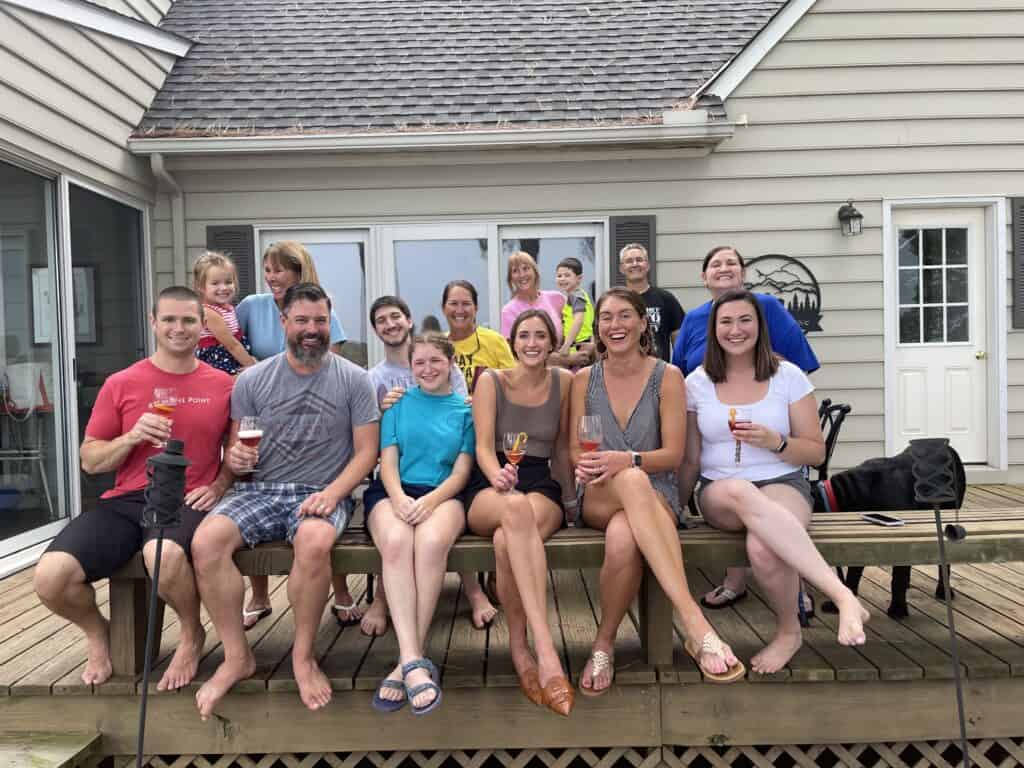
Susan G. Komen and Johnson & Johnson encourage you to take control of your health and discuss your family health history with not just your family members, but also your doctor to understand your risk of breast cancer and other cancers, including prostate cancer for men.
Annamarie Scarff’s family health history includes breast cancer on her mother, Joan’s, side and prostate cancer on her father, Cliff’s, side. Two of Joan’s sisters are in remission for breast cancer. “I’m like a Venn diagram,” Annamarie said.
A decade ago, one of Joan’s cousins was diagnosed with breast cancer. She underwent genetic testing at that time, but the results came back negative. “At the time, my family was misinformed that if she was negative for BRCA inherited gene mutation; they all were,” Annamarie said. “Then, years later, when one of my aunts was diagnosed, she had genetic testing done and she is BRCA positive, which means she has a genetic mutation. She actually had breast cancer twice.” Annamarie’s aunt ultimately had a hysterectomy and double mastectomy, followed by additional chemotherapy.
Once Annamarie’s aunt learned she was BRCA positive, other members on her mom’s side of the family began to undergo testing. Her other aunt who had breast cancer tested negative. “With one sister testing negative and one positive, my mother decided to meet with a genetic counselor at that point and get tested,” Annamarie said. “Unfortunately, my mother was positive for a BRCA inherited gene mutation.”
Joan underwent a hysterectomy and a double mastectomy. The pathology report showed that there were precancerous cells in Joan’s breast. “We’re fortunate it hadn’t progressed to breast cancer,” Annamarie said. “I’m really grateful we learned she was positive in time to prevent something more serious.”
Annamarie had had surgery twice to remove ovarian cysts. With her family history and her own experiences with ovarian cysts, Annamarie realized she needed to be proactive about her health and get tested, too. Her second surgery to remove an ovarian cyst was shortly after her mother’s genetic testing and spurred her to ask for genetic testing for herself.
At a surgical follow up, Annamarie mentioned her family health history to her doctor. He advised her to get copies of her mom’s and aunt’s results and send them in with her saliva swab.



Waiting for the test results was nerve wracking. “I’m 26 and single, and there was this feeling of potentially having a bomb drop on me,” she said. “Fortunately, I’m negative for the gene mutation, but it was a scary time waiting to find out whether or not I was positive.”
“It’s really important for people to take the steps to learn more about their family health history and their personal health,” Annamarie said. “For me, it’s the number one way to make sure I can maximize my quality of life. What uphill battle could I be potentially fighting? What can I do to get ahead of that? If you’re sitting in the darkness, you can’t do anything until you get a diagnosis, and at that point, you’re at the treatment stage.”
Twelve maternal relatives have undergone genetic testing. Six tested positive for a BRCA inherited gene mutation and six tested negative. “One of my uncles was resistant to getting tested. He’s in his 60s and his thought was – do I really need to do this at my age? One of my aunts who had breast cancer shared her feelings and her experience, and in the end, he agreed to have the testing, which showed he was BRCA positive,” Annamarie said. “It turned out he had melanoma, and they were able to remove it and he’s now taking it seriously. He’s being as proactive as possible with mammograms, pancreatic MRIs and quarterly skin testing. He now believes that knowledge is power.”
Annamarie’s brother also tested positive for the BRCA inherited gene mutation and is also taking his health more seriously. “He’s like, okay, what additional doctor appointments do I need? What monitoring and what tests? Knowing he’s at an elevated risk – breast cancer on his mother’s side, prostate on his father’s – he’s really trying to focus on prevention.”
While genetic testing can be scary and it’s normal to fear the answers, knowing allows someone to take charge of their health. “My family has a history of cancer. It’s important to undergo the testing and yes, a positive result is lifechanging,” Annamarie said, “but you’re also perhaps saving yourself from developing cancer through preventive treatment and measures. This has been a cross-generational education within my family. It was eye-opening and scary, but it’s important to know the answers.”
Statements and opinions expressed are that of the individual and do not express the views or opinions of Susan G. Komen. This information is being provided for educational purposes only and is not to be construed as medical advice. Persons with breast cancer should consult their healthcare provider with specific questions or concerns about their treatment.
Both women and men can have a BRCA gene mutation, which can be passed on (inherited) from either the mother or father to their daughter(s) or son(s). If there’s a history of breast and prostate (or other) cancers in your family, talk to your doctor or a genetic counselor to see if genetic testing is right for you and your family. To learn more, visit BRCAinmen.com.




